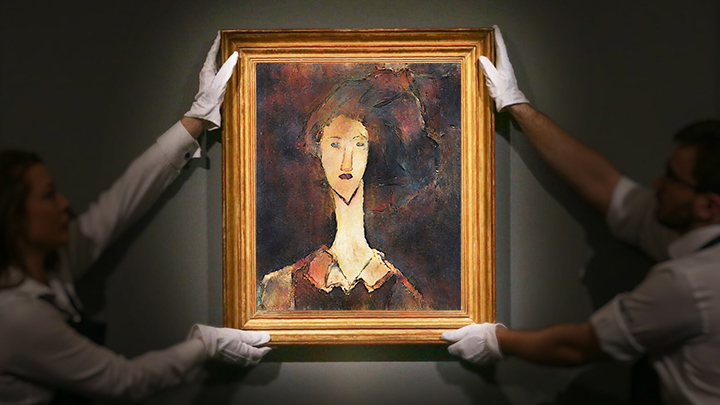Amedeo Modigliani’s ‘Portrait of a Girl’ (1917) is currently held at the Tate in London. But, hidden beneath this painting is the figure of a woman that researchers have suggested is Modigliani’s ex-lover, Beatrice Hastings. The couple had a tumultuous relationship ending in 1916. One year after their breakup, ‘Portrait of a Girl’ was completed. The timing suggests that Modigliani intentionally painted over his past girlfriend. Whilst Modigliani’s ‘Portrait of a Girl’ was titled ‘Mademoiselle Victoria’ at the 1929 exhibition held at the Lefevre Gallery, the identity of the model remains uncertain.
Oxia Palus, CogX 2021 finalist, is a London-based artificial intelligence startup founded by two Ph.D. candidates at University College London with the mission of resurrecting the world’s lost art, engineered a proprietary approach combining artistic creation and technology. By means of spectroscopic imaging, artificial intelligence, and 3D printing Oxia Palus actualized the pentimento beneath Modigliani’s portrait. Using a processed x-ray fluorescence image Oxia Palus trained an AI model to map between x-ray-like images and Modigliani paintings, from this Oxia Palus reconstructed a lost masterpiece, Modigliani’s lost Beatrice Hastings – the world’s second NeoMaster. “The world’s hidden art, locked beneath layers of paint, lies dormant waiting to be reborn. In the next few years with the correct application of spectroscopic imaging, artificial intelligence, and 3D printing, we can actualize hundreds of lost works and change the history of art,” said George Cann, Oxia Palus co-founder.
Oxia Palus co-developed two patent-pending technologies with MORF Gallery, a Silicon Valley and Hollywood-based creator, enabler and purveyor of fine art that enables technologies like AI, neuroscience, robotics and NFTs, to create this NeoMaster. “MORF Gallery is incredibly proud to play a role in enabling Oxia Palus to bring this exquisite piece of art history to the world. Great art evokes emotion from its creator and its admirers, so it is incredible to imagine Modigliani’s emotions with each brushstroke deliberately erasing the memory of Hastings. Bringing this painting back to life is simply amazing,” said Scott Birnbaum, CEO of MORF Gallery. Birnbaum continued, “As a follow up to the successful launch of April’s world-first NeoMaster, Oxia Palus and MORF Gallery have unlocked the keys to uncovering and protecting historically important artworks lost to the ages.”
As featured this week in The Guardian, this piece will be on display in the prestigious London-based Lebenson Gallery from June 10th – 30th, along with the world’s first NeoMaster that was hidden under a Picasso for a century, and a video demonstration of the neomastic reconstruction process on a MORF ArtStick. This is the first time that either NeoMaster will be physically exhibited. MORF strategically chose Lebenson because of their premier London location, their patrons across Europe, their visionary AI art curation, and because of their collaboration in DEEEP, London’s first AI Art Fair. “The Lebenson Gallery is thrilled to work with MORF Gallery. We are joining forces to promote cutting-edge artists and projects in artificial intelligence and art. The NeoMasters Exhibition is a great example of how these advanced technologies can reveal the unseen and interpret the unknown,” said Stephane Bejean Lebenson, Founder and Owner of Lebenson Gallery.







